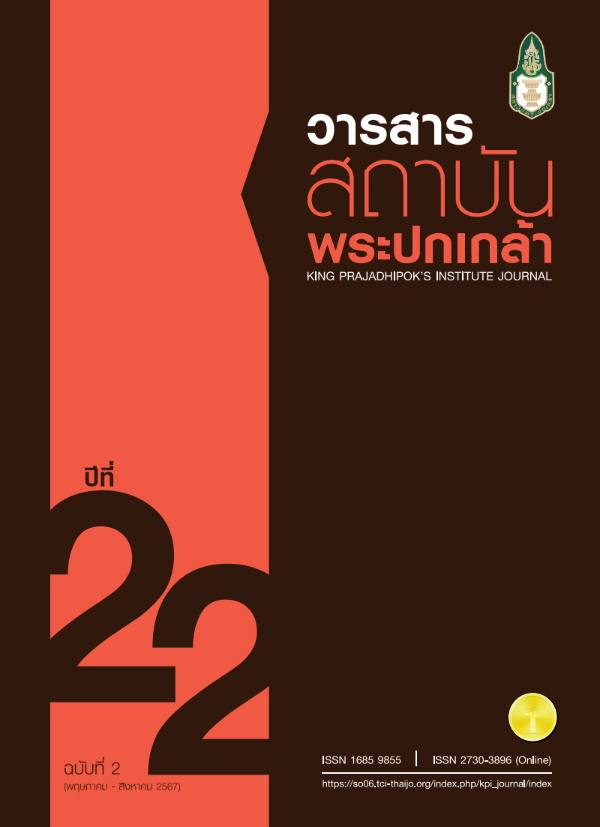The Peace Process from the Perspectives of the People in Southern Thailand
Main Article Content
Abstract
This research article focuses on the participation of people in conflict areas of the southern border provinces of Thailand in the peace process. Although this study is part of the Peace Survey 2023, it employs qualitative data analysis to understand perspectives on the peace process. The research results reveal dimensions of power relations among various actors at different levels. Additionally, the peace process faces challenges due to the limited negotiation space within the critical peace approach. The findings emphasize the importance of amplifying public voices in discussions, highlighting the role of public informants in various sectors who support and believe in the potential for free and safe public consultations.
Amid the political transition during the 2023 election period, which is linked to public hopes for progress in peace talks, the study found a significant challenge from the public's perspective: a lack of concrete results in the discussion process has contributed to the continued violence.
Article Details

This work is licensed under a Creative Commons Attribution-NonCommercial-NoDerivatives 4.0 International License.
@ 2020 King Prajadhipok's Institute The Government Complex Commemorating All Right Reserved.
References
ภาษาไทย
เครือข่ายวิชาการ Peace Survey. (2559). ผลการสำรวจความคิดเห็นของประชาชนต่อกระบวนการสันติภาพจังหวัดชายแดนภาคใต้ ครั้งที่ 1 กุมภาพันธ์-มีนาคม 2559. กรุงเทพฯ: สำนักสันติวิธีและธรรมาภิบาล สถาบันพระปกเกล้า.
เครือข่ายวิชาการ Peace Survey. (2563). ผลการสํารวจความคิดเห็นของประชาชนต่อกระบวนการสันติภาพจังหวัดชายแดนภาคใต้ ครั้งที่ 5 กันยายน–ตุลาคม 2562. กรุงเทพฯ: สำนักสันติวิธีและธรรมาภิบาล สถาบันพระปกเกล้า.
เครือข่ายวิชาการ Peace Survey. (2564). เอกสารเผยแพร่การแถลงผลการสํารวจความคิดเห็นของประชาชนต่อกระบวนการสันติภาพจังหวัดชายแดนภาคใต้ ครั้งที่ 6. สืบค้นจาก https://cscd.psu.ac.th/th/node/342
ฆายนีย์ ช. บุญพันธ์. (2562, มกราคม-เมษายน). การมีส่วนร่วมของกลุ่มต่างๆ เพื่อสร้างสันติภาพอย่างยั่งยืนในชายแดนใต้. วารสารสถาบันพระปกเกล้า, 17(1), 100-117.
จันจิรา สมบัติพูนสิริ. (2558). เหตุใดต่อต้านด้วยสันติวิธีจึงได้ผล: ตรรกะเชิงยุทธศาสตร์ของความขัดแย้งแบบไม่ใช้ความรุนแรง. กรุงเทพฯ: คบไฟ.
ฉัตรชัย ศรีเมืองกาญจนา. (2567). แผนปฏิบัติการร่วมเพื่อสร้างสันติสุขแบบองค์รวม (JCPP). ใน ร้อยเรื่องเมืองไทย. กรุงเทพฯ: สำนักงานเลขาธิการสภาผู้แทนราษฎร. สืบค้นจาก https://dl.parliament.go.th/backoffice/viewer2300/web/viewer.php
ไทยพีบีเอส. (2566). เริ่มแล้ว! เวทีพูดคุยสันติสุขแบบเต็มคณะ. สืบค้นจาก https://www.thaipbs.or.th/news/content/324798
พัทธ์ธีรา นาคอุไรรัตน์. (2556). “คนกลุ่มน้อยนิด” กับ “ชีวิตแห่งการต่อรอง” ในบริบทความรุนแรงถึงตาย: กรณีศึกษาชาวคาทอลิกในปัตตานี. (ปรัชญาดุษฎีบัณฑิต) มหาวิทยาลัย ธรรมศาสตร์, วิทยาลัยสหวิทยาการ, สาขาวิชาสหวิทยาการ. กรุงเทพฯ.
สำนักข่าวอิศรา. (2557). ทำไมต้องเปลี่ยนจาก "พูดคุยสันติภาพ" เป็น "พูดคุยเพื่อสันติสุข". สืบค้นจาก https://www.isranews.org/content-page/item/31925-talk_31925.html
สิทธิ ตระกูลวงศ์. (2562). กระบวนการพูดคุยเพื่อสันติสุข จชต. : ความท่้าทายของการต่อสู้ทางความคิดตามแนวทางสันติวิธีในทัศนะของผู้ปฏิบัติงานจริง (ห้วงปี 2558 - 2561). กรุงเทพฯ: เมจิก แอนด์ พิคเซลเวิคส์ สตูดิโอ
ภาษาอังกฤษ
Ballamingie, Patricia. (2009). Democratizing Public Consultation Processes: Some Critical Insights. Journal of Public Deliberation, 5(1). Retrieved from https://www.publicdeliberation.net/jpd/vol5/iss1/art11?utm_source=www.publicdeliberation.net%2Fjpd%2Fvol5%2Fiss1%2Fart11&utm_medium=PDF&utm_campaign=PDFCoverPages
Berry, Laura H., Koski, Jessica., Verkuijl ,Cleo., Strambo, Claudia & Piggot, Georgia. (2019). Making Space: How Public Participation Shapes Environmental decision-making. Retrieved from http://www.jstor.com/stable/resrep22993
Boonpunth, Kayanee. Chor. & Rolls, G. Mark. (2017). Peace Survey–Lessons Learned from Northern Ireland to Southern Thailand. ASR: CMU Journal of Social Sciences and Humanities, 4(2), 133-153.
Buetow, Stephen. (2003). The Ethics of Public Consultation in Health Care: An Orthodox Jewish Perspective. Health Care Analysis, 11( 2), 151-160.
Choldin, H. M. (1986). Statistics and Politics: The "Hispanic Issue" in the 1980 Census. Demography, 23(3), 403-418.
Darby, John & Ginty, R. M. (2008). Introduction: What Peace? What Process? In John Darby. & Roger Mac Ginty (Eds.), Contemporary Peacemaking
(pp. 1-8). Palgrave Macmillan, London. https://doi.org/
1057/9780230584556_1
Fishkin, James S. (2009). When People Speak Deliberative Democracy and Public Consultation. Oxford: Oxford University Press.
Galtung, J. & Jacobsen, Carl G. (2000). Searching for Peace: The Road to TRANSCEND. London: Pluto Press.
Health Funding Authority. (2000). Consultation Obligations and Guidelines. Christchurch: Health Funding.
Herbolzheimer, Kristian. (2015). Multiple Paths to Peace: Public Participation for Transformative and Sustainable Peace Processes. Kultur, 2(3), 139-156.
Horkheimer, Max. (1989). Traditional and Critical Theory. In Max Horkheimer, Critical Theory: Selected Essays (pp.188-243). New York: Continuum.
Innovation for Poverty Action. (2021). Measuring Knowledge and Understanding of the Peace Process in Myanmar. Retrieved from https://poverty-action.org/measuring-knowledge-and-understanding-peace-process-myanmar
Litva, Andrea et al. (2002). The Public is Too Subjective: Public Involvement at Different Levels of Health-care Decision Making. Social Science and Medicine, 54(1), 1825–1837.
Ozerdam, Alpaslan & Ginty, Mac Roger. (2019). Comparing Peace Process. London: Routledge.
Patomäki, Heikki. (2001). The Challenge of Critical Theories: Peace Research at the Start of the New Century. Journal of Peace Research, 38(6), 723-737.
Paffenholz, Thania. (2014). Broadening Participation in Peace Processes: Dilemmas & Options for Mediators. Retrieved from https://hdcentre.org/
wp-content/uploads/2021/03/MPS4-Broadening-participation-in-peace-processes-July-2014-1.pdf
Public Health Commission. (1994). Consultation Guidelines. Wellington: Public Health Commission.


